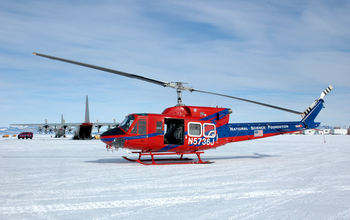![]()
Press Release 14-066
NSF-managed U.S. Antarctic Program recognized for its search-and-rescue efforts![]()
New Zealand Search and Rescue Council honors outstanding joint achievement of U.S. and New Zealand Antarctic programs
|
A U.S. Antarctic Program helicopter at McMurdo Station, with LC-130 cargo aircraft in background. |
May 14, 2014
The New Zealand Search and Rescue Council has recognized the U.S. Antarctic Program, which is managed by the National Science Foundation’s Division of Polar Programs, for its cooperation with Antarctica New Zealand in response to the January 2013 loss of a Twin Otter aircraft and its crew in the Antarctic.
On Tuesday May 13 (New Zealand time), the Hon. Michael Woodhouse, New Zealand’s associate transport minister, presented a Certificate of Achievement for Operational Activity jointly to the U.S. Antarctic Program (USAP) and Antarctica New Zealand.
“The pre-planning and the subsequent search-and-rescue operation were both conducted through the McMurdo Station Emergency Operations Centre (EOC) in Antarctica coordinating with the Rescue Coordination Centre NZ,” the Council noted. “This enabled the response team to be supported, well briefed and resourced for a deep polar field rescue operation.”
“Antarctica offers an unparalleled range of opportunities to conduct world-class science across a range of disciplines,” said Kelly K. Falkner, director of the Division of Polar Programs. “Unfortunately, those opportunities are not without their risks in one of the world’s harshest environments. The USAP and its international partners stand ready to assist each other at all times when dangers arise and the need occurs. We are honored to receive this award and very pleased that it recognizes the cooperative nature of our search-and-rescue response.”
Added Graeme Ayres, Antarctica New Zealand’s general manager for operations, “This award recognizes the courage and dedication of the people from the U.S. and N.Z. programs who are employed as part of the Joint Search and Rescue Team (JSART). I’m proud to be receiving this award on behalf of them and Antarctica New Zealand. This response demonstrates the benefits of the collaboration between our two programs and our continued commitment to safety of personnel working in Antarctica. Our thoughts are with the family, friends and colleagues of the Kenn Borek Air crew lost in this tragedy.”
The Twin Otter crash occurred on Jan. 23 in the Queen Alexandra Range, roughly 675 kilometers (419 miles) south of McMurdo Station, NSF’s logistics hub on the continent, and New Zealand’s Scott Base, which is near McMurdo Station.
The search-and-rescue effort employed the JSART; an LC-130 Hercules aircraft, flown by the New York Air National Guard; a DC-3 Basler and Twin Otter aircraft, flown by Kenn Borek Air, Ltd, a contractor to the U.S. program; and PHI, Inc. the U.S. helicopter contractor, and New Zealand helicopter support.
JSART members were ferried to the remote crash site–at an elevation of roughly 3,900 meters (13,000 feet)–by helicopter, after having established a local staging area on Beardmore Glacier.
The joint search-and-rescue effort managed to place experts at the crash site to examine the wreckage. But that examination indicated it would be unsafe to further disturb the wreckage, which was largely embedded in snow and ice on a steep slope.
The team was able to recover some equipment from the exposed tail of the Twin Otter, including the cockpit voice recorder. They were unable to safely recover the remains of the crew.
“This operation demonstrated the strong relationship that exists between the United States Antarctic Program and Antarctica New Zealand to support a unified SAR response in Antarctica,” according to the Council.
NSF, through its Division of Polar Programs. manages the U.S. Antarctic Program in accordance with a 1982 Presidential Memorandum Regarding Antarctica.
-NSF-
![]()
Media Contacts
Peter West, NSF, (703) 292-7530, pwest@nsf.gov
Program Contacts
Brian W. Stone, NSF, (703) 292-8030, bstone@nsf.gov
Related Websites
NSF Cooperating with Italy, New Zealand in Search for Downed Plane in Antarctica: http://www.nsf.gov/news/news_summ.jsp?cntn_id=126676
U.S., New Zealand Search-and-Rescue Teams Recalled From Antarctic Plane Crash Site: http://www.nsf.gov/news/news_summ.jsp?cntn_id=126712
New Zealand Coroner Rules Officially That January Plane Crash Killed Antarctic Twin Otter Crew: http://www.nsf.gov/news/news_summ.jsp?cntn_id=128281
![]()
The National Science Foundation (NSF) is an independent federal agency that supports fundamental research and education across all fields of science and engineering. In fiscal year (FY) 2014, its budget is $7.2 billion. NSF funds reach all 50 states through grants to nearly 2,000 colleges, universities and other institutions. Each year, NSF receives about 50,000 competitive requests for funding, and makes about 11,500 new funding awards. NSF also awards about $593 million in professional and service contracts yearly.
Useful NSF Web Sites:
NSF Home Page: http://www.nsf.gov
NSF News: http://www.nsf.gov/news/
For the News Media: http://www.nsf.gov/news/newsroom.jsp
Science and Engineering Statistics: http://www.nsf.gov/statistics/
Awards Searches: http://www.nsf.gov/awardsearch/
![]()
